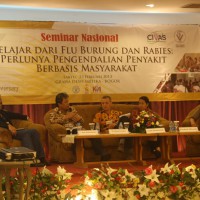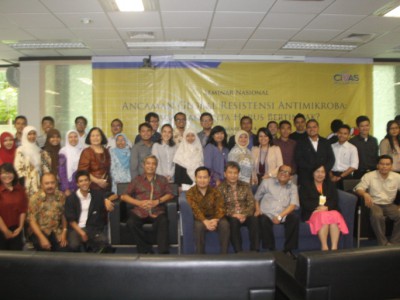National Seminar on Animal Health and Food Safety
Thursday, 23 February 2006
Center for Indonesian Analytical Studies (CIVAS) has conducted a national seminar on Animal Health and Food Safety with a theme “Achieve Human Health and Welfare through Animal Health, Welfare and Food Safety Improvement” on Thursday, February 23rd, 2006 at Ambhara Hotel, Jakarta. This event was held in association with the launching of CIVAS as a Veterinary Medicine based Non Government Organization which is still the only NGO in this field.
The whole day seminar which started at 08.30 WIB and ended at 17.00 WIB was opened with opening remarks from the Executive Director of CIVAS, drh Albertus Teguh Muljono and the Director of Animal Health, Directorate General of Livestock, Ministry of Agriculture, Republic of Indonesia, Dr. drh. Syamsul Bahri; and then it was continued by the launching of CIVAS. Four (4) speakers were presented in two (2) sessions which were followed by interactive discussions at the end of the presentation in each session.
The first session presented two (2) speakers who are also in the Steering Committee of CIVAS and they were Prof. Dr. F. G. Winarno (Head of the International Dairy Federation Indonesia) who presented “Food Safety: Problems, Solutions and Challenges for Indonesia” and Dr. drh. H. Soehadji (Former Head of Directorate General of Livestock) who presented “Animal Health: Problems, Solutions and Challenges for Indonesia”. The second session was conducted after lunch by presenting drh. Tri Satya Putri Naipospos M.Phill., Ph.D (Head of Directive Board of CIVAS) who delivered “Towards Strong Animal Health in Indonesia through Participation of Veterinary Non Government Organizations” and drh. Wiwiek Bagja (Secretary General of Indonesian Veterinary Profession Association) who presented “Partnership of Veterinary Non Government Organizations with Veterinary Profession Associations in Supporting National Animal Health”. The first session was also filled with remarks and spontaneous comments from the former Ministry of Agriculture in Gotong Royong Cabinet, Prof. Dr. Bungaran Saragih.
The whole day seminar on Animal Health and Food Safety was attended by 87 participants and all members of CIVAS. The seminar participants came from government institutions (central and regional livestock services office), veterinary research and test laboratories, private companies in animal medicine and animal origin food products, veterinary associations, veterinary medicine students and mass media. The seminar was supported by various parties, which were the government (Ministry of Agriculture of Indonesia) and private companies in animal origin food products and medicine in Indonesia.
The seminar results have been formulated by the CIVAS Seminar Formulating Team which consists of drh. Memed Z. Hasan (Chairman), Dr. drh. Denny W. Lukman, Msi, drh. Didin Sudiana, MM, drh. Elly Sawitri, MSc and drh. Noeri Widowati, MSc. Based on the explanations from experts and speakers and also from the participants’ discussion results, those that could be formulated and recommended as results from the National Seminar of Animal Health and Food Safety are as the following:
- In terms of food safety in Indonesia, Indonesia still faces problems concerning animal disease which can be transmitted through food (food borne disease) either caused by microorganisms (bacteria, virus, mold and parasite) or non-microorganism (prion, toxin, residue, food additive, etc).
- The strategy which should be built to improve food safety is collaboration between stake holders to reinforce the food safety network integratedly between competent authorities, those involved in animal origin food products, consumers and other related parties.
- To facilitate international trade, there should be harmonization between national food product standards and the international food product standards regarding Indonesia has a quite large market share in the Asian and European market.
- In food safety policy, Indonesia should implement “maximum security” and this should be supported by reliable scientific analysis and studies/assessments.
- With the increasing demand of basic animal health service and infectious animal disease outbreak control in autonom regions, the central government should support and facilitate the availability of infrastructure and proporsional employment of animal health officers.
- Socialization of a national animal health system is necessary as it is a logical consequence of the implementation of structural adaptation policy which happened after regional autonom. It caused reduction in the professional role of Government Veterinarians in each Province/Municipal/District, thus the impact is uncertainty of the position of regional veterinary authority and which also caused hindrance in the animal disease reporting and information system.
- Animal health is part of public health and protection of the genetic pool. It is also part of agricultural development in the general terms. Because of that, there needs to be reorientation of livestock safety from the animal disease approach to the animal health approach.
- To support infectious and zoonotic animal disease control and eradication program, conducive conditions are essential and it can be obtain by stability in social politics, effective and stringent professional leadership, structured organization with clear commando and coordination pathways, access to accurate information, continuous surveillance system that is effective in detecting cases and early signs, availability of infrastructures, optimal resources and animal health human resources.
- The presence of a Veterinary NGO has become a third sector, that is a public sector which concentrates on social awareness and can provide animal health services which are “public goods” where the implementation will always synergize with the Indonesian Veterinary Profession Association.
- Hopefully the Veterinary NGO can become a “professional power” which is a power that can stand their gound when the government’s policy in veterinary field is considered no longer in accordance with the profession’s believe and the public’s demand.
- Recommendation:
- Encourage the government and the House of Representative of Indonesia to formulate an Animal Health Law which is separate from the UU No.6 Tahun 1967 as legal reference for the implementation of all animal health and veterinary public health aspects in Indonesia.
- The presence of veterinary authority at central and regional government is imperative to hold authority and responsibility concerning animal health and veterinary public heatlh to support infectious disease control and eradication and also international trade.
- Recommend all veterinarians in Indonesia to do retrospection by remembering the veterinary profession’s oath and code of ethics, considering the current situation, moral as a binder for Indonesia’s veterinary profession has experience erosion.
- To increase appreciation of the Indonesian Veterinary Medicine profession as to equal the Indonesian Medical profession, a routine “Scientific Forum” among veterinary and medical experts is considered necessary to be held with inisiative from Univeristies, Profession Organizations or Veterinary NGOs.
- Support the government’s effort, in this case the Ministry of Agriculture, to improve the capability of Regional Veterinary Laboratories so it will have the qualifications of a Biosafety and Biosecurity Level 3 Laboratory and conduct “continuing education” on the human resources working at the Veterinary Laboratories. This way, Indonesia will no longer be dependent on reference laboratories in other countries.









